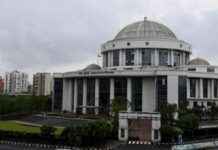Demolition of Illegal Floors in Khar West Building: Bombay High Court Takes Action
In a significant development, the Bombay High Court has issued an order for the demolition of seven out of the eight floors of the Shivanjali Co-operative Housing Society located in Khar West. The court has deemed the construction of these floors as unauthorized and illegal, marking a crucial step towards enforcing building regulations and upholding the law.
The case revolves around the original commencement certificate (CC) issued in May 1993, which only approved the construction of a single floor in the building. However, the developers, AG Developers and Rao & Associates, proceeded to build a basement, ground floor, and eight upper floors without the necessary permissions, blatantly disregarding the approved structure. This unauthorized construction has been deemed a clear violation of rules by the High Court.
Legal Proceedings and Fines Imposed
During the legal proceedings, it came to light that a resident of the eighth floor, Rafique Kabani, had been fined Rs 50,000 for allegedly misleading the court. Kabani had obtained an interim stay on a demolition notice by selectively presenting information to the judiciary, thereby obstructing the BMC’s efforts to enforce the law. The court found Kabani guilty of misleading the authorities and imposed the fine as a consequence of his actions.
Kabani had challenged the BMC’s 2018 demolition order, arguing that a show-cause notice issued in September 2017 only highlighted minor irregularities. However, it was revealed that the developers had unlawfully constructed additional floors and allowed society members to occupy them without obtaining critical permissions such as fire clearance and occupancy certificates. The court’s decision to penalize Kabani underscores the importance of transparency and adherence to legal procedures in such cases.
Authorities’ Response and Compliance Measures
In response to the illegal construction, BMC counsel Rajshekhar Govilkar emphasized that the building had approvals for only the ground and first floors. The additional floors had been constructed without permits, leading to a violation of building regulations and putting residents at risk. Despite multiple applications from the society to regularize these illegal floors, the authorities had rejected the requests, signaling a zero-tolerance approach towards unauthorized constructions.
The High Court directed the BMC to carry out the demolition of the illegal floors within the next three months, with a compliance report due by January 6, 2025. The court’s decision highlights the importance of upholding building regulations and ensuring that constructions adhere to legal requirements. The ruling also serves as a reminder that unauthorized constructions will not be tolerated, and strict actions will be taken to enforce compliance with the law.
As the case unfolds, it is essential for all stakeholders involved to cooperate with the authorities and adhere to the legal process. Building regulations are put in place to safeguard the well-being of residents and ensure the structural integrity of buildings. By following the prescribed guidelines and obtaining the necessary permits, developers and residents can contribute to creating safe and sustainable living spaces for all.
In conclusion, the Bombay High Court’s order for the demolition of illegal floors in the Khar West building is a crucial step towards upholding building regulations and enforcing the law. The ruling sends a clear message that unauthorized constructions will not be tolerated, and strict actions will be taken to ensure compliance with legal requirements. It is imperative for all stakeholders to cooperate with the authorities and follow the prescribed guidelines to create safe and sustainable living spaces for all residents.




















